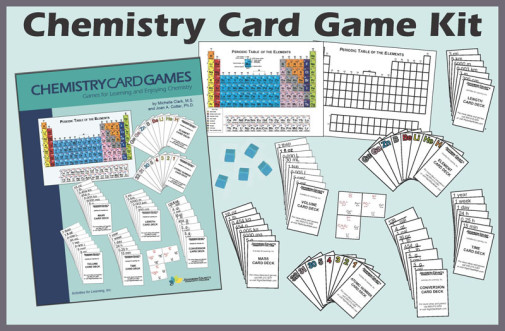We use cookies to make your experience better. To comply with the new e-Privacy directive, we need to ask for your consent to set the cookies. Learn more.
Chemistry Card Games Kit
Mastering the concepts and mathematics of Chemistry overwhelms and discourages many students. Prepare your upper middle schoolers and high schoolers for success with the Right Start Math Chemistry Card Games Kit. Implementing many of the underlying foundational concepts used in their Math Card Games, the 130 games in this kit teach various topics and provide practice in basic chemistry. Divided into five topical sections, students practice unit conversions, density, periodic table, ionic compounds, and concentrations. Sections provide an overview of concepts, objectives, background information, and instructions for each game. Games begin with foundational concepts and become more challenging throughout the chapter. Prerequisites include familiarity of the periodic table, multiplication, division, and basic fractions. Algebra is not required. Recommendations for game play is included for typical and advanced students. Games require 2+ players. Kit includes Chemistry Card Games book, and the following required card decks: Atomic Cards, Conversion Cards, Chemistry Corners™ Cards, Elements Cards, Length Cards, Mass Cards, Prompt Cards, Time Cards, and Volume Cards. Also included are a glossy periodic table (8"x 11"), glossy chemistry tri-fold reference, and centimeter cubes.
Michelle Clark, college professor from Johnson County Community College, has joined forces with Dr. Joan A. Cotter to create chemistry card games! These games are for high school students, college students, as well as for advanced middle-school students.
Math literacy is fundamental to student success in chemistry courses. Chemistry students of all ages benefit from a review of basic mathematical operations, as well as a reframing of math itself. Research demonstrates that student difficulties in chemistry do not arise from the application of math to chemistry, but rather the students' underlying mathematical deficits before enrolling in chemistry. In other words, without a good mathematics foundation, many students find chemistry challenging to learn. Fresh and fun games enable these students to not only succeed with the mathematics in chemistry, but to enjoy using math to solve chemistry problems.
Chemistry Card Games was created with many of the same underlying foundational concepts used in Math Card Games, the games used in the RightStart™ Math curriculum. Included in the kit: Chemistry Card Games book, Nine decks of cards (Atomic Cards, Conversion Cards, Chemistry Corners™ Cards, Elements Cards, Length Cards, Mass Cards, Prompt Cards, Time Cards, and Volume Cards), Periodic Table,Chemistry Tri-Fold Reference, Centimeter Cubes
Homeschool Chemistry Curriculum, Workbooks, Lab Materials, Kits, Games, and Chemistry Lab Supplies
| Product Format: | Other |
|---|---|
| Grades: | 7-12 |
| Brand: | Activities for Learning |
| Length in Inches: | 9.375 |
| Width in Inches: | 12.625 |
| Height in Inches: | 3.25 |
| Weight in Pounds: | 3.9 |
Be the first to review this item
- Start typing and we'll see if it was already asked and answered.
- If there aren't already some matches, submit a new question.
- You'll get fast answers from customers who really own the item(s) and from our product experts. (About half the time you'll get an answer in under 2 hours!)
- Which items will best meet your needs
- What customers who own an item think of it
- How to use, fix, or take care of an item
- Product information
- General advice related to the types of products we sell
- Our store policies
For questions about an order you have placed, please contact customer support directly.
















